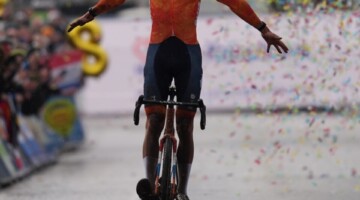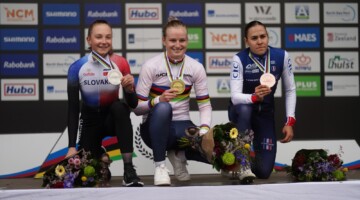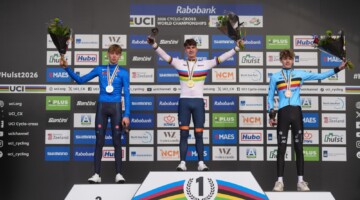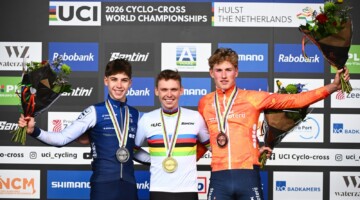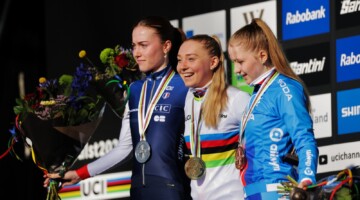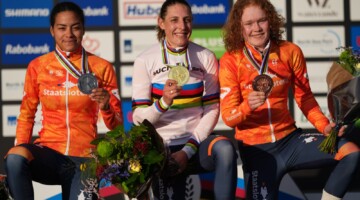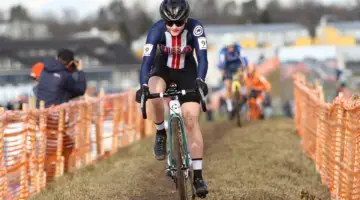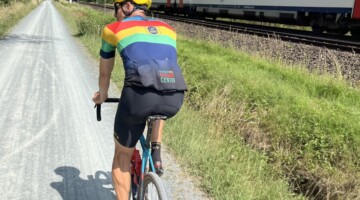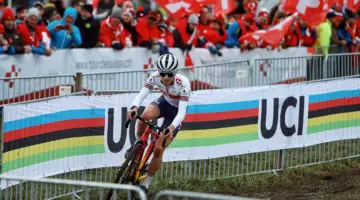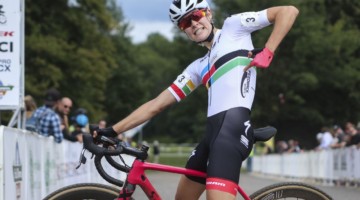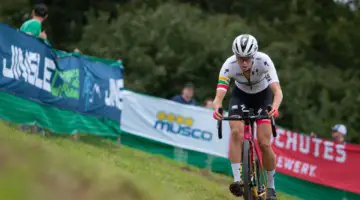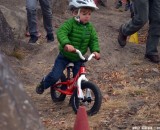
Kids may make getting full workouts in difficult, but kiddie cross more than makes up for it. © Cyclocross Magazine
by Jacob Fetty
Kids grow up too quickly. We all know the cliche: you even think about blinking and you miss something … or multiple things. Blink once and your child is talking, blink twice and your little one is borrowing the keys to your car. As engaged parents and motivated athletes, we don’t want to miss out on anything, save diaper changes, but we still have our own goals and need to be our own people. How is it possible to train while not letting the guilt eat at you. We already take so much time away from our families by just going to work or by sending the kids to school.
I will offer a few tips on balancing cartoons and kids with mud and skinny, knobby tires before I defer to other real life moms and dads for the their two cents. After all, Mother knows best.
The two most important yet trivial tidbits that I can offer are:
1. Be OK with a little “me” time. It is good for the mental. On the flip side, it can be nice for your partner/spouse to have one-on-one time with your child. To give not only our families the best of us as well as ourselves the best of us, we need to feel like ourselves. Riding is often that monk-like exercise that brings our universe to center.
2. Be balanced. Not every day needs to be a four-hour training session. A few solid one hour rides infused with intervals can be more than adequate during the week. Longer rides on weekends are great times for injecting volume. Certainly, wrapping up your training ride a few minutes early to ensure that you are home in time for dinner or to tuck your little tike in is well worth cutting your ride a wee bit shorter, especially if you are on the trainer.
Hectic days combined with limited day light this time of year means that I end up on the trainer exclusively during the week. I make sure that I have headphones on so that if my son does whine for me, I don’t hear it. Daddy guilt will stop a training session faster than a broken chain. My wife and I check in daily to make sure we are on the same page. I “make up” for my ride time by generally being the one doing bath time. This lets me get in one-on-one quality water park-esque fun and gives my wife a return break from the demanding needs and wants of an 18-month old. When possible during the summer months or weekends, I try to train before he gets up in the morning.
Tips from real moms and dads who balance real world responsibilities with aggressive cycling goals:
“I love to race and seek out races that have kid’s race too. This way my whole family can go with me on the weekend and my son can participate.”
Jennie May has two kids, both are in elementary school. She is both a Girl Scout leader and a category 2 road racer. For Jennie, we have found it more applicable to train between bus drop-off and pick-up, while the kids are at school. We pay close attention to the intensity of the efforts so that she still has energy to be a full-contact mom once the tornado that is kid’s energy arrives home. Additionally, when not racing, we look to leave her weekends light on training so that she can devote these days to her family.
Mark Babcock is a publisher and father to a basically brand new baby girl. While I don’t personally coach Mark, he offers a proud papa’s perspective on pedaling while also being an engaged father: “I try to make up for the time I spend training with dedicated family activity, even if that means foregoing a little recovery. After long rides, I will go on a 30-45 minute hike with my daughter in the Baby Bjørn while my wife holds the dogs’ leashes. It’s hard to get motivated to be active right after training, but it’s very rewarding.”
“I also make sure that I’m fully engaged when I’m with my family. I do my best to make sure they know that I love them and that they are my priority. I’ve found that being a good husband/dad buys you lots of training time!”
Ronnie Bratcher is a busy, Belgium beer loving, stressed out recruiter with a seven-year-old daughter. He races cat 3 and masters road and ’cross races. Ronnie has perhaps my favorite take on the importance of training and certainly one of the most inspirational.
He says, “Before my daughter was born, I had quit competitive cycling and was pretty much a recreational rider at best (FAT) . When Holly was born, not sure what snapped, but I had a renewed spirit after she entering this planet that I realized that I wanted to be with her as long as I can meaning live to a ripe ole age to experience her adulthood. I realized how out of shape I was and my spirit moved me back into the bike racing game.”
For Ronnie, training is not exclusively about being in shape to race. It’s an added health insurance policy. Be fit. Be healthy. Be there for my family as long as possible. Ronnie fits in his training where he can during the day so that he can spend evenings with his daughter.
Being committed to flexibility and open to communication helps Ronnie fit his workouts into his carousal of responsibilities.
Cheryl Fuller-Muller is a Master’s National Champion, wife and mother to a four year old boy. Before having a child, Cheryl was racing exclusively on the Elite level and had basically endless amounts of available time to train. Now, with more responsibility and less rest, she has to be more cautious about where her efforts are placed. Little boys don’t care if mom’s legs are too tired to play GI Joe. You have to train hard but still have gas in the tank.
“I think once you have a child there is automatically an unspoken mommy guilt associated with anything that takes away from taking care of your child,” Cheryl says on the topic. “I still struggle with this.”
Cheryl had to learn to be okay with and learn to define her training in terms of quality, not in volume. Now, she spends fewer days on the bike, with less volume but she makes them count, to the tune of recent podium appearances at Master’s National Championships (track).
Balancing family life with training is difficult, especially with kids involved, but it can be done. By being creative with your planning, open to communication with your coach and engaged with your family, you can reach your cycling goals.

